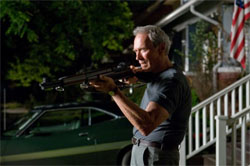For a man who’s been acting in films for over 50 years and directing them for over 30, Gran Torino might seem like a victory lap—a final, self-indulgent opportunity for Clint Eastwood to play Clint Eastwood in a Clint Eastwood movie. Thankfully, Eastwood’s latest opus sidesteps such slovenly self-aggrandizement and, much like relatively recent directorial outings Mystic River and Million Dollar Baby, proves that the grizzled veteran knows how to inject just the right amount of plot twists and character dynamism into a storyline that might otherwise run the risk of becoming hackneyed and predictable.

The specters of Eastwood’s past haunt the film’s protagonist, a curmudgeonly Korean War vet and retired auto worker named Walt Kowalski. Both respected and loathed as a man who “calls it like he sees it,” Walt snarls and sneers like a grandfatherly (but more openly bigoted) Dirty Harry and hauls in tow a murky past à la the Man With No Name or Unforgiven’s William Munny. It’s Eastwood’s funniest role in eons; nearly each racist refrain that spews from the man’s cracked lips merit giddy (yet consciously suppressed) laughter from even the most politically correct moviegoer.
Walt’s insular existence as a widower comes under fire when a family of garrulous Hmong immigrants moves into the dilapidated house next door. The teenaged boy of the family, Thao Vang Lor (Bee Vang), attempts to steal Walt’s prized 1972 Gran Torino as initiation into a gang of rough-necked Hmong boys, a venture that proves fruitless—and nearly fatal—when Walt, rifle in hand, catches Thao bumbling in his garage and sends the boy scampering home.
Later when Walt, (again armed) unwittingly saves Thao and his sister, Sue (a convincing Ahney Her), from the harassing Hmong gangbangers, he becomes the reluctant hero of the neighborhood and the begrudging mentor of Thao, whose mother forces him into indentured servitude to Walt as repayment for the foiled robbery.
Walt presents a sagely, nuanced approach to issues like justice and courage which often receive a cut-and-dry treatment in mainstream cinema. Years of experience inform Walt’s ultimate strategy for combating the gang, which—in line with Eastwood’s other recent plot twists—proves counterintuitive at first but ultimately revelatory. Gran Torino, expanded to wide release earlier this month, doesn’t showcase a new approach to filmmaking for the aging director, but it may present a new sort of hero, one who understands bravery’s dingier nooks and less hallowed crannies.
It hardly bears mentioning that subtlety has never been one of Eastwood’s strong suits. Frequent shots of Walt sitting on his porch with the ol’ Stars and Stripes wagging in the background may irk observant viewers, and Walt’s devotion to his American-bred Gran Torino—and his overcooked zeal for a domestic industry that barely churns out cars these days—serves as a plot device as effective as it is blunt. In the script’s worst moments, the film’s themes are literally announced out loud: “You know, Walt, you have more in common with these Hmong people than your own children!” the protagonist declares to the mirror.
Considering Eastwood’s oeuvre of broad, sweeping cinematic gestures and emotional heft that’ll bludgeon the viewer to death rather than go unnoticed, Gran Torino’s flaws are hardly surprising. As unwieldy as they may seem, however, Eastwood’s heart-on-sleeve moments of devastation are often so well developed, so unusually and unexpectedly concocted as to feel completely earned. The film’s climax publicizes its import in neon glow, sure, but you’ll be too busy reassembling your shattered heart to voice a complaint.
Many have predicted that films dealing with serious or depressing issues would suffer in the box office as Americans, eager to forget about their recession-induced woes, pour money into cheap laughs and frivolous action movies. Serious though it may be, Gran Torino is art that can and should be appreciated even in our troubled times. Walt embodies a troubled, flawed, but ultimately benevolent and warmly paternal guardian at a time when practically everyone is asking for a bailout while wondering if there truly is no one watching out for them.
Eastwood continues to tower as a sturdy, indomitable presence to Americans, and if Gran Torino proves to be his acting swan song (as he has indicated), it’s an appropriate one. Eastwood’s role as Walt Kowalski is easily the most solipsistic performance of his latter, halcyon days—an encapsulation of everything Clint and a welcome reminder of why he’s long been an icon of American cinema.




